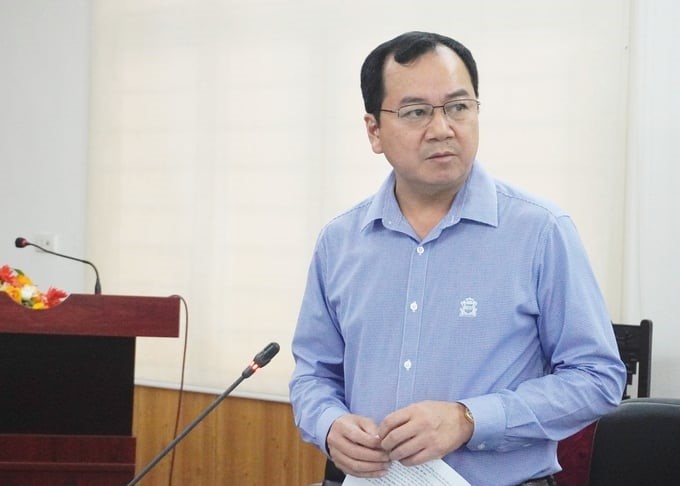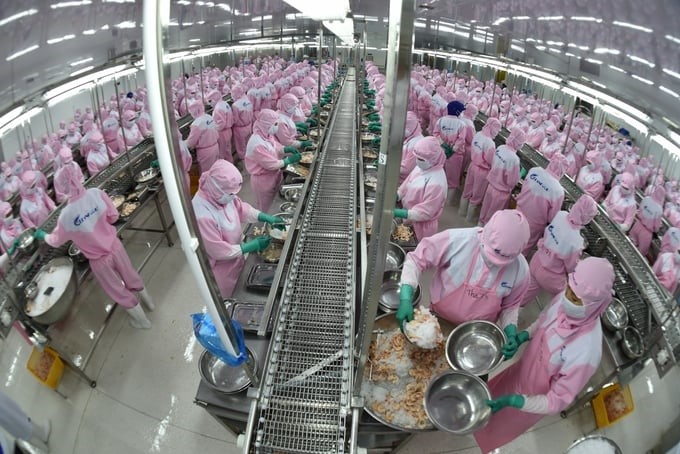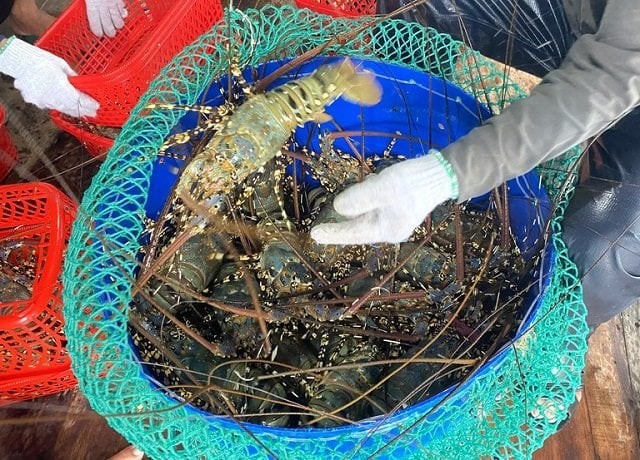May 19, 2025 | 09:53 GMT +7
May 19, 2025 | 09:53 GMT +7
Hotline: 0913.378.918
May 19, 2025 | 09:53 GMT +7
Hotline: 0913.378.918

Deputy Minister of Agriculture and Rural Development Phung Duc Tien said: "The fisheries industry still has a lot of work that needs to be done, so without determination, persistence, and resilience, it will be impossible to succeed." Photo: Hong Tham.
On April 3, in Hanoi, Deputy Minister of Agriculture and Rural Development Phung Duc Tien chaired a briefing for the first quarter of 2024 and listened to reports on a number of recommendations from associations of the fisheries industry.
Mr. Tran Dinh Luan, Director of the Department of Fisheries, said that in the first quarter of 2024, the fisheries industry had more favorable conditions than in the first quarter of 2023, which were the attention and drastic and effective direction of the Government, the Prime Minister, the Minister of Agriculture and Rural Development, the Deputy Minister in charge of the industry, localities, the active participation of associations, and the efforts of the fishermen community.
The seafood exploitation field achieved many good results due to favorable marine weather. There were many pelagic fish resources, so fishing boats and fishermen operated effectively, especially fishermen in the South Central provinces, whose tuna fishing output has increased highly.
As for aquaculture, the Department of Fisheries has also given timely directions and proactively issued instructions to prevent cold in the North and heat in the South.
According to Mr. Luan, the country's total seafood output in the first quarter of 2024 is estimated at over 1.94 million tons, an increase of 2.2% over the same period in 2023. Of which, fishing output is estimated at 876,500 tons, up 0.2% over the same period in 2023; farming output is estimated at approximately 1.07 million tons, up 3.9% over the same period in 2023.
“Our country's seafood export turnover in the first quarter of 2024 is estimated to reach USD 1.86 billion, an increase of 1.9% over the same period in 2023. The economy still has many difficulties, so consumption demand has not yet recovered. However, this growth is a positive signal for the coming time," said Director Tran Dinh Luan.

Mr. Tran Dinh Luan, Director of the Department of Fisheries, said that in the first quarter of 2024, the fisheries industry had more favorable conditions than in the first quarter of 2023. Photo: Hong Tham.
Regarding the issue of food safety and hygiene, Mr. Le Ba Anh, Deputy Director of the Department of Quality, Processing, and Market Development, said that there were still four warning samples of antibiotic violations discovered in the first quarter of 2024, including 3 samples of pangasius and 1 sample of shrimp, down compared to the same period last year.
Warnings of violations related to food safety and hygiene in the first quarter of 2024 increased compared to the same period last year because the Chinese market accumulated data from the end of 2023 and the beginning of 2024; if only the first 3 months of 2024 are counted, the warnings do not increase.
Besides the advantages, the fisheries industry in the first quarter of 2024 also faces many difficulties. The world commodity market has many fluctuations due to the effects of political, economic, and social factors in countries.
Strategic competition between major countries continues to be fierce, military conflicts between Russia and Ukraine and in the Gaza Strip prolong, and instability escalates in the Red Sea.
Many countries continue to maintain tight monetary policies, and aggregate demand is weak, causing slow growth of the global economy and a sharp decrease in global consumption demand, including seafood products. Thus, seafood export activities encounter many difficulties.

Our country's seafood export turnover in the first quarter of 2024 is estimated to reach USD 1.86 billion, an increase of 1.9% over the same period in 2023. Photo: PTC.
The prices of some goods and input materials for seafood development are still high. High logistics costs put pressure on production activities, especially when consumption demand slows down and the scale of production has been narrowed.
Seafood fishing output is still at a high level, not meeting the requirements of gradually reducing fishing output according to the orientation of the National Strategy and Program on development of effective and sustainable fishing for the period 2022–2025, with orientations toward 2030.
The number of unregistered fishing vessels is still very large, 15,940 vessels. The reduction in the number of fishing vessels is still slow, with 84,682 vessels in February and 85,001 vessels in March. This has not yet met the Prime Minister's Strategy 339/QD-TTg dated March 11, 2021 and Project 208/QD-Circular dated March 10, 2023 on converting a number of fishing occupations affecting resources and the ecological environment.
Regarding the issue of exporting ornate rock lobster to the Chinese market, Mr. Ba Anh said, "Up to this point, there has been no progress."

Exporting ornate rock lobster to the Chinese market is still at a standstill. Photo: KS.
Deputy Minister Phung Duc Tien affirmed that the space for the fisheries industry is still very large, so there is still a lot of work that needs to be done. The fisheries industry is increasingly assessed as having an important role and position. Although positive results have been achieved in the first quarter of 2024, it still needs time to acknowledge, calm down, and set immediate and long-term goals.
Deputy Minister Phung Duc Tien directed that in the second quarter of 2024 and the next stage, the aquaculture field needs to review farming subjects and develop multi-objectives. Seafood exploitation reviews the number of fishing vessels and solves issues of fleet monitoring, traceability, vessel cruise monitoring equipment, etc.
Regarding the fight against illegal, unreported, and unregulated (IUU) fishing, over the past 7 years, there have been positive changes thanks to the efforts of the entire industry. At this time, there needs to be further transformation in the hope of soon removing the "yellow card." With marine conservation, the co-management model needs to be paid attention to.
“Recently, the entire industry has made efforts. However, efforts have been made, and more efforts are needed. There is still a lot of work that needs to be done, so without determination, persistence, and resilience, it will be impossible to succeed. It is necessary to be determined every month and every quarter to bring the fisheries industry to the finish line," the leader of the Ministry of Agriculture and Rural Development emphasized.
Deputy Minister of Agriculture and Rural Development Phung Duc Tien said: "Reducing exploitation, increasing aquaculture, and marine conservation are the three pillars of fisheries economic development. However, there is another important issue that needs attention, which is infrastructure. Farming, fishing, export processing, disease prevention, etc. all rely on infrastructure, so this is also a huge issue that needs attention."
Translated by Huyen Vu Thu

(VAN) In the face of counterfeit and imitation products, Khanh Hoa Salanganes Nest Company hopes for the prompt completion of the legal framework, strict enforcement against violations, and protection of the bird’s nest brand.

(VAN) Japan's efforts to lower the price of rice through the release of its stockpile may finally be making some progress, albeit at a snail's pace.

(VAN) U.S. tariffs are not only a 'shock', but also an opportunity for Vietnamese businesses to renew their mindset toward comprehensive development.

(VAN) As Bac Giang lychee enters the harvest season, Minister Do Duc Duy expects that the fruit will contribute greatly to agricultural exports due to standardized production and deep processing.

(VAN) Consumers have shown a preference for free-range eggs, but those farming systems are more vulnerable to biosecurity risks like bird flu.
/2025/05/09/5701-1-184335_301.jpg)
(VAN) Vietnam’s eel exports nearly doubled thanks to a mud-free farming model, opening up new prospects while still facing numerous barriers related to international standards.

(VAN) Minister Do Duc Duy warned that if production is not professionalized and supply chains are not transparent, the U.S. market could become a growth bottleneck.